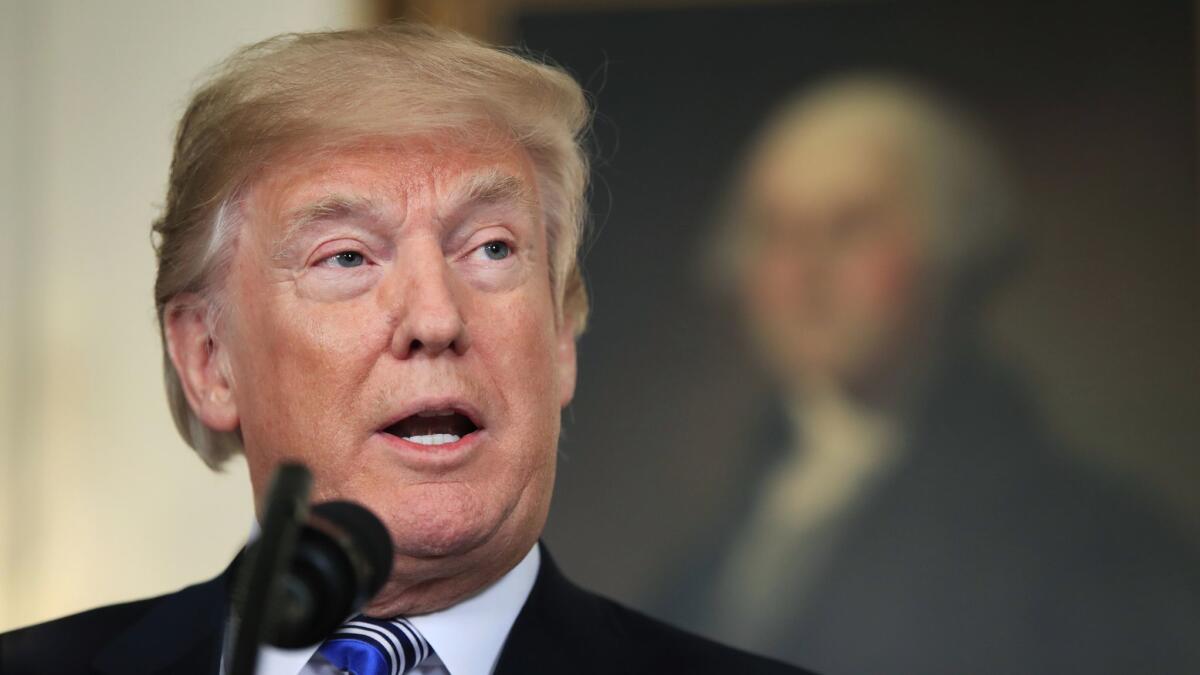Editorial: Trump’s speak-no-evil policy on Russia undermines his administration’s attempts to get tough

- Share via
The Trump administration has announced that it will expel 60 Russian diplomats — who the administration says are really intelligence operatives — and shut down one of Russia’s four remaining consulates in the United States. This is not exactly a declaration of war, but it is an appropriately muscular response to the poisoning earlier this month of Sergei Skripal, a former Russian spy living in Britain, apparently by a nerve agent that the British government has traced to Russia. Skripal’s daughter Yulia was also poisoned.
That the United States coordinated its response with its European allies is also good news. It’s another sign that someone in the administration — despite Donald Trump’s repeated disparagement of the NATO alliance — recognizes the value of solidarity in responding to Russian provocations. More than 20 countries, including non-NATO members Ireland, Ukraine and Australia, have announced that they will expel Russian personnel.
Why is Trump so often silent about Russian misconduct, even as his administration takes tough action?
Yet, President Trump’s continued reluctance to personally criticize Vladimir Putin muddles the message. A president who is quick to sound off on Twitter and at campaign-style rallies about matters great and small repeatedly has failed to voice significant criticism of Russia and has responded defensively to criticism of his reticence.
For example, after he was criticized for congratulating Putin on his reelection, Trump tweeted: “The Fake News Media is crazed because they wanted me to excoriate him. They are wrong! Getting along with Russia (and others) is a good thing, not a bad thing. They can help solve problems with North Korea, Syria, Ukraine, ISIS, Iran and even the coming Arms Race.”
There is some truth in this. To take Trump’s last point first, negotiations between Russia and the U.S. to prevent a new nuclear arms race are not only defensible but necessary. The U.S. also should be prepared to engage with Russia, a permanent member of the United Nations Security Council, in resolving other conflicts. (Unfortunately, two of the examples Trump cited — Syria and Ukraine — undermine his argument. Engagement with Russia has done little to check Moscow’s interference in the internal affairs of Ukraine or its bloody alliance with Bashar Assad.)
But even if engaging Russia on issues of global significance makes sense, that is different from Trump’s version of “getting along with Russia,” which seems to involve refraining from criticism of Russian provocations, including meddling in the 2016 election, and lavishing congratulations on Putin for a victory in an election in which Putin faced little serious opposition and in which a key potential opponent wasn’t allowed to run. Ironically, Trump’s speak-no-evil policy undermines his effort to explore ways in which cooperation with Russia might be in this country’s interest. If Trump is viewed by the American public as soft on Russia, otherwise rational initiatives will be suspect.
On Monday, even as his advisors were condemning Russia, Trump remained mum. Imagine if the president himself, rather than a “senior administration official” speaking on background to reporters, had said this: “The Russian government has shown malicious contempt for the sovereignty and security of countries worldwide. It has repeatedly sought to subvert and discredit Western institutions. These efforts are ongoing.” Or if the president, rather than Press Secretary Sandra Huckabee Sanders, had said that the attack on Skripal was the latest in Russia’s “ongoing pattern of destabilizing activities around the world.”
When the president’s words don’t match his administration’s actions, some will assume that the president and the rest of the administration aren’t on the same page. Already, Russia’s ambassador to the U.S. has complained that the expulsions conflict with the “telephone conversation between our two presidents.”
Why is Trump so often silent about Russian misconduct, even as his administration takes tough action? You don’t need to be a psychologist or an FBI investigator to suspect that his odd aversion to criticizing Russia is tied to allegations that Russia interfered in last year’s election on Trump’s behalf — a fact that Trump is reluctant to acknowledge because he sees it as undermining the legitimacy of his victory.
Trump’s defenders can argue that actions speak louder than words, and that the administration’s actions send a clear message. But that message is inevitably muddled when the president can’t bring himself to say loud and clear why those actions are necessary.
Follow the Opinion section on Twitter @latimesopinion and Facebook
More to Read
A cure for the common opinion
Get thought-provoking perspectives with our weekly newsletter.
You may occasionally receive promotional content from the Los Angeles Times.









